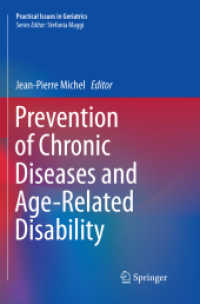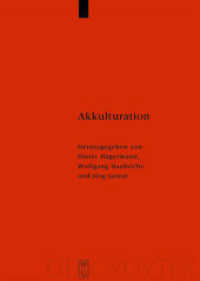- ホーム
- > 洋書
- > 英文書
- > History / World
Full Description
Writing about Palestine and the Palestinians continue to be controversial. Until the late 1980s, the question of Palestine was approached through Western social theories that had appeared after World War 2. This endowed European settlers and colonists the mission of guiding the "backward" natives of Palestine to modernity. However, since the work of Palestinian scholar Elia Zureik, the study of Israel, and the "ethnic relations" in Palestine-Israel has been radically shifted.
Building on Zureik's work, this book studies the colonial project in Palestine and how it has transformed Palestinians' lives. Zureik had argued that Israel was the product of a colonization process and so should be studied through the same concepts and theorization as South Africa, Rhodesia, Australia, and other colonial societies. He also rejected the moral and civilizational superiority of the European settlers. Developing this work, the contributors here argue that colonialism is not only a political-economic system but also a "mode of life" and consciousness, which has far-reaching consequences for both the settlers and the indigenous population. Across 13 chapters (in addition to the introduction and the afterward), the book covers topics such as settler colonialism, dispossession, the separation wall, surveillance technologies, decolonisation methodologies and popular resistance. Composed mostly of Palestinian scholars and scholars of Palestinian heritage, it is the first book in which the indigenous Palestinians not merely "write back", but principally aim to lay the foundations for decolonial social science research on Palestine.
Contents
Introduction, Nur Masalha, SOAS, University of London, UK and Ahmad Sa'di, University of the Negev, Israel
Part One: Colonial and Decolonial: Conceptualizations of Palestine
1. Towards a Decolonization of Palestinian Studies, Ahmad Sa'di, Ben-Gurion University of the Negev, Israel
2. Indigenous versus Colonial-Settler Toponymy and the Struggle over the Cultural and Political Geography of Palestine: The Appropriation of Palestinian Place-Names by the Israeli State, Nur Masalha, SOAS, University of London, UK
3. What's the Problem with the Jewish State? Raef Zreik, The Van Leer Jerusalem Institute, Israel
Part Two: Zionist Settler-Colonialism: Tenets and Practices
4. The Epistemology of Zionist Settler Colonialism and the Ontological Securitization of Palestinians, Amal Jamal, Tel Aviv University, Israel
5. The Unfinished Zionist Settler-Colonial Conquest of its Elusive 'Last Frontier', and Indigenous Palestinian Bedouin Arab Resistance, Ismael Abu-Saad, Ben-Gurion University of the Negev, Israel
6. The Paradox of Settler Colonial Citizenship in Israel, Areej Sabbagh-Khoury, Hebrew University of Jerusalem, Israel
7. Celebrating Survival: Palestinian Epistemes and Resisting Anti-Palestinian Racism, Yasmeen Abu-Laban, University of Alberta, Canada
Part Three: Zionist Settler-Colonialism: Surveillance
8. Secrecy as Colonial Violence: The Case of Occupied East Jerusalem, Nadera Shalhoub-Kevorkian, Queen Mary University of London, UK and Abeer Otman, Hebrew University of Jerusalem, Israel
9. Israel's Telecommunications Lines and Digital Surveillance Routes, Helga Tawil-Souri, New York University, USA
Part Four: Palestine: Connections, Ruptures and Popular Resistance
10. Settler Colonialism in Palestine: Connections and Ruptures, Magid Shihade, Dar Al-Kalima University, Palestine
11. Popular Resistance in Palestine, Marwan Darweish, Coventry University, UK
Part Five: Issues of Bio-Power
12. The Effect of the Separation of the Wall on the West Bank Labour Market, Sami Miaari, Tel Aviv University, Israel and Dorde Miloslav, Trinity College, Ireland
13. Palestinian Refugee Archives UNRWA and the Problem with Sources, Salim Tamari, Birzeit University, Palestine and Eliza Zureik, Queens University, Canada
In Lieu of Afterword
14. Liminal Lights in Dark Places: Elia Zureik's Sociological and Critical Contribution to Palestinian and Surveillance Studies, David Lyon, Queen's University, Canada
Bibliography








